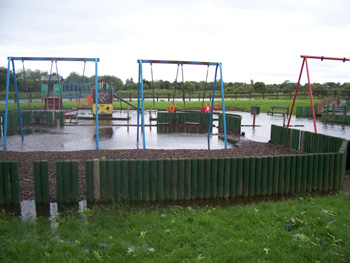Hull flood children to tell their story

Children who were caught up in the Hull floods of June 2007 are to take part in a study which aims to put their experiences at the heart of decision making.
Young people were particularly hard hit by the flooding to homes, schools and community facilities which caused significant disruption to their lives for months and, in some cases, years.
But until now, little academic work had been done to record their experiences.
A team of Lancaster University researchers who carried out a two-year study into the impact of the floods have now launched a fresh piece of work which will bridge that gap using story boards, creative writing and informal peer group discussions and interviews.
The study, funded by the Economic and Social Research Council, the Environment Agency and Hull City Council focuses on around 60 children from primary school age to teenagers.
Young people taking part in the project will use story boards to draw, paint and paste their version of events during and after the floods. They will be encouraged to use creative writing to get their message across and will be given the opportunity to take part in group work where they can discuss their experiences with their peers.
Dr Marion Walker of the Lancaster Environment Centre is leading the research.
She said: “We know that 36,558 school children suffered in the floods and in the recovery process but most existing accounts of flooding and flood recovery take no account of the perspectives of children and young people.
“For example, 114,400 pupil days were lost in school and we need to know the stories behind those statistics. We want to find out what issues are of particular concern to young people and how they think things could be done better in the future.
“Children are key to building strong, resilient communities - they bring people together and it’s important that we hear what they have to say in order to pass that detail onto policy makers.”
Environment Agency scientist Emma Skinner said: "More than two million properties in England and Wales are at risk from flooding and changes in our climate, such as more severe storms and wetter winters, will increase that risk.
"We can reduce the probability of flooding from rivers and the sea, and we also work to reduce the damage floods can do. Understanding the way children and young people respond to flooding and other climatic extremes will help us to communicate better with people living in flood risk areas."
Children, Flood and Urban Resilience: Understanding children and young people's experience and agency in the flood recovery process is a one year study funded by ESRC (£45K) the Environment Agency (£35K) and Hull City Council (£15K).
The research team are: Will Medd, Rebecca Sims and Marion Walker from the Geography Division, Lancaster Environment Centre, Lancaster University and colleagues from Middlesex University (Sue Tapsell) and the University of Surrey (Jo Moran-Ellis and Kate Burningham).